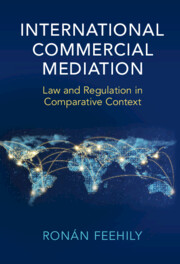Book contents
- International Commercial Mediation
- International Commercial Mediation
- Copyright page
- Dedication
- Contents
- Preface
- Foreword
- Cases
- Statutes
- International Conventions, Laws, Codes and Rules
- 1 Introduction to Commercial Mediation
- 2 Commercial Mediation in the International Context
- 3 Agreements for Future Mediation
- 4 Approaches to Mediation
- 5 Mediators and Their Appointment
- 6 Lawyers and Other Professional Mediation Supporters
- 7 Conduct and Costs
- 8 Mediated Settlement Agreements
- 9 Confidentiality
- 10 Process Controversies
- Bibliography
- Index
1 - Introduction to Commercial Mediation
Published online by Cambridge University Press: 01 September 2022
- International Commercial Mediation
- International Commercial Mediation
- Copyright page
- Dedication
- Contents
- Preface
- Foreword
- Cases
- Statutes
- International Conventions, Laws, Codes and Rules
- 1 Introduction to Commercial Mediation
- 2 Commercial Mediation in the International Context
- 3 Agreements for Future Mediation
- 4 Approaches to Mediation
- 5 Mediators and Their Appointment
- 6 Lawyers and Other Professional Mediation Supporters
- 7 Conduct and Costs
- 8 Mediated Settlement Agreements
- 9 Confidentiality
- 10 Process Controversies
- Bibliography
- Index
Summary
Disputes should be resolved by using the appropriate process, whether that be litigation or a form of alternative dispute resolution (ADR) such as mediation. Court systems in jurisdictions throughout the world are organised on the assumption that most commercial cases will settle, often at the doors of the court. Litigation consequently operates as a legal default or fallback option. Parties should be aware of the various forms of ADR available and where commercial mediation fits within the range of processes. Certain dispute resolution processes may be particularly well suited to certain types of dispute, and the parties’ choice should be informed by clear criteria. Mediation has proved difficult to differentiate from other forms of ADR, in part due to the lack of a generally accepted definition. Attempts to define mediation have proved challenging, given its varied use in different contexts. However, a comparative view of mediation definitions, both statutory and judicial, generally reveals a broad consensus across jurisdictions on the treatment of issues such as dispute, voluntary nature, communication between the parties and consensual resolution by the parties.
- Type
- Chapter
- Information
- International Commercial MediationLaw and Regulation in Comparative Context, pp. 1 - 28Publisher: Cambridge University PressPrint publication year: 2022

